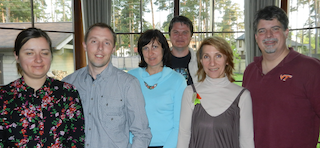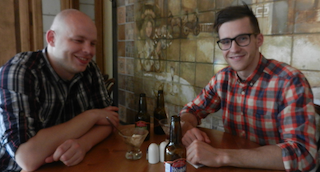Church Planting in Latvia
Church Planting in Latvia
Some member unions of the EBF have developed really impressive mission programs and the Baptist Union of Latvia is certainly leading with its very exciting vision for church planting work!
The Latvian population is about 2,3 million. More than 60% speak Latvian language, however Russian is also popular. Latvian is derived from an ancient Baltic language and much favored in the nation. The confessional structure of this Baltic State is mainly composed of Lutherans, Catholics, Orthodox and Baptists.
Baptists in Latvia
The Latvian Baptists trace their roots to the second half of the 19th century when a spiritual revival took place as groups of indigenous people started to read the Bible.
The first believers’ baptism took place on September 9, 1860 in Memele (now Klaipeda, Lithuania) and this date is considered for the first beginning of the contemporary Latvian Baptist movement. Since then many local congregations were established and chapels erected.
The Soviet era brought dark clouds over the Baptist work in Latvia. Thousands of believers and hundreds of leaders were deported to the labor camps, many church buildings were confiscated and congregations closed down. But even that harsh persecution didn’t stop the people from worshiping God, youth and Sunday school work was taking place, lectures in theology were being offered, and Christian books were printed and distributed.
After the fall of Soviet Union the Latvian Baptists have regained long desired freedom and at once started dynamic mission work. A Seminary, Latvian Christian Radio, Publishing House and Union Offices as well as a Christian Bookstore found their location in the reclaimed historic building which serves now as the Baptist Center in Riga.
There are altogether 88 local churches in Latvia with a total membership of about 6500.
Baptist Church Planting in Latvia
The Baptist Union of Latvia is leading in the group of member unions of the EBF which have developed very impressive church planting programs! Its vision for church planting is very exciting!
 Pastor Peteris Sprogis, the bishop of Latvian Baptist Union says: “In recent years the leaders of our union discovered the need to give more attention to church planting. Thus we have adopted the goal to plant 100 new churches by 2020. The Baltic Pastoral Institute has initiated the appropriate training for future pastors and church planters. We recognize that church planting must be at the top of our denominational agenda. This requires us to pray and think clearly about the development of a master plan that will release the potential of churches and individuals in missional activities. Our desire is to see more and more people come to know God and experience His transforming power.”
Pastor Peteris Sprogis, the bishop of Latvian Baptist Union says: “In recent years the leaders of our union discovered the need to give more attention to church planting. Thus we have adopted the goal to plant 100 new churches by 2020. The Baltic Pastoral Institute has initiated the appropriate training for future pastors and church planters. We recognize that church planting must be at the top of our denominational agenda. This requires us to pray and think clearly about the development of a master plan that will release the potential of churches and individuals in missional activities. Our desire is to see more and more people come to know God and experience His transforming power.”
Kaspars coordinates the church planting movement in Latvia. He explains the vision of mission work which in practice overlaps with the church planting program. The whole program is called “M4” as it consists of 4 modules of teaching. The acronym M4 stands for: Master, Mission, Multiplication and Movement. The vision is to build a network of missional communities rather than traditional congregations.
 Kaspars is personally involved in developing and multiplying missional communities in the north part of Riga district. Right now there are 2 communities (Adazi, Langstini) and one other is developing (Vidrizi). Four couples are the core group of the Adazi mission team. They meet on weekly basis in a private home and once a month there is a special event. The group will celebrate a first baptism this summer.
Kaspars is personally involved in developing and multiplying missional communities in the north part of Riga district. Right now there are 2 communities (Adazi, Langstini) and one other is developing (Vidrizi). Four couples are the core group of the Adazi mission team. They meet on weekly basis in a private home and once a month there is a special event. The group will celebrate a first baptism this summer.
The team had started 3 years ago with a marriage course, later organized an Alpha course, a Story of God course and a Vacations Bible School thus reaching out to many local people. They emphasize that the most important are relationships however it is not easy at all to make new contacts in a countryside area. New people gladly come to special events but are not equally eager to attend regular Sunday worship.
Someone from the local community called on a church planting team member because a child was sick and the parents who called had not known anybody else who could pray for their child... The team member prayed for that child and this is how the new relationship got started.
The goal is that Christian families with missional heart may be trained and thus multiplied in other local communities of Riga and the whole of Latvia. The dream is to go beyond a single home group and start more groups, thus witnessing to more people in different places.
 Krisjanis and Tomas lead a fellowship which was started in 2010, after a mission conference. They follow the M4 principles and the name of this new church planting initiative is: Riga Missional Communities.
Krisjanis and Tomas lead a fellowship which was started in 2010, after a mission conference. They follow the M4 principles and the name of this new church planting initiative is: Riga Missional Communities.
The core group originates from two traditional churches, the Mathew’s Baptist Church (largest congregation in Latvia) being one of them. They meet regularly on the weekly basis as two separate groups and once a month both groups get together making a crowd of about 30 people, most of them being 20-30 years old, both men and women. The plan is to start a third group soon.
The group organized various activities, like for ex. throwing a grill party in the city and about 100 turned up. The goal is to build a community of Christians who will be the ‘light and salt’ to Riga in its all 58 local districts. The idea is that the present community should multiply. The target group are simply people from the area of proximity, not excluding anybody.
Both the church planting vision and the Pastoral Baptist Institute (PBI) draw many young people who discover their calling and later become involved in ministry. Development and multiplication of missional communities is the main ingredient of the church planting vision in the Baptist Union of Latvia.
The most popular obstacles are: secularism and skepticism of people, opposition from traditional churches and migrations.
Pray that:
• God may call more leaders who will be able to build new church planting teams.
• The existing missional communities may be growing and multiplying.
• Any obstacles may be overcome and the church planting vision may be implemented successfully.
To help planting reproducing churches!
To help growing healthy churches!
For the glory of God!